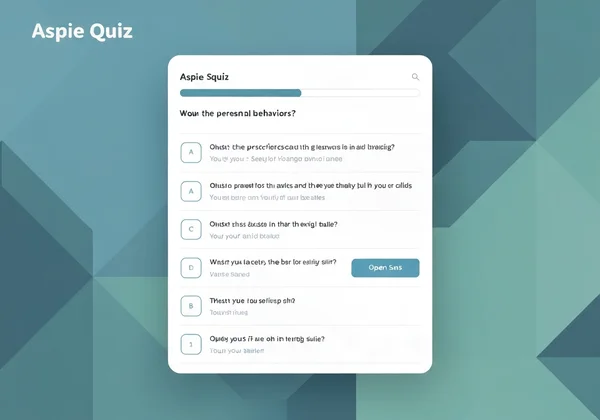Start Your Aspie Quiz Journey: A Guide to Adult Self-Discovery
November 11, 2025 | By Leo Sinclair
Have you ever felt like you're operating on a different wavelength from everyone else? Many adults navigate the world with a persistent feeling of being "different," leading them to ask the deeply personal question: am I autistic? This journey of self-discovery can be confusing, but you are not alone. Understanding your unique neurological makeup is the first step toward self-acceptance and empowerment. What is the Aspie quiz, and how can it help? It's a tool designed to illuminate this path.
This guide is here to support you. We will explore the common signs of autism in adults, introduce a helpful tool for initial exploration, and discuss what steps you can take next. Your journey to self-understanding is valid and important. Let's begin that exploration together. A great starting point is to explore your traits right now.

Understanding Key Signs of Autism in Adults
Autism in adults often presents differently than it does in children, especially in individuals who have gone undiagnosed for years. Many have developed sophisticated coping mechanisms to navigate a world not always built for them. Recognizing these signs is a crucial part of adult self-discovery.
Social Communication: More Than Just Being Shy
For many autistic adults, social interaction can feel like a complex performance that everyone else has the script for. This isn't about shyness; it's about processing social cues differently. You might find it challenging to interpret body language, sarcasm, or unspoken rules of conversation. You may prefer direct, literal communication and find small talk exhausting or pointless. Alternatively, you might talk extensively about your passions, sometimes not noticing if others are losing interest.
Sensory Sensitivities and Unique Interests: A Different World
The world can feel intensely overwhelming or wonderfully detailed. Sensory sensitivities are a core part of the autistic experience. The hum of fluorescent lights might be distracting, the texture of certain foods unbearable, or a crowded room a complete sensory assault. Conversely, you might seek out specific sensory inputs, like the comfort of a weighted blanket or the repetitive motion of a fidget toy. This unique sensory world is often paired with deep, passionate interests—sometimes called special interests—where you can focus for hours, becoming an expert in your chosen topic.
Repetitive Behaviors & Need for Routine: Seeking Comfort in Predictability
A structured routine can be a powerful source of comfort and stability in a chaotic world. Autistic adults often thrive on predictability, finding that unexpected changes can cause significant stress or anxiety. This preference for sameness can also manifest as repetitive behaviors or "stimming," such as tapping your fingers, rocking, or pacing. These actions are not meaningless; they are a way to self-soothe, manage emotions, and focus your thoughts.
The Phenomenon of Masking: Hiding Your True Self
Many undiagnosed adults, particularly women, become masters of masking. This is the conscious or subconscious act of hiding your natural autistic traits to fit in with neurotypical peers. It might involve forcing eye contact even when it's uncomfortable, mimicking the social behaviors of others, or suppressing your stims. While masking can be a survival tool, it is mentally and emotionally draining and can lead to burnout and a feeling of lost identity.
The Aspie Quiz: A Starting Point for Exploration
If these descriptions resonate with you, you might be looking for a way to gather more information. An online self-assessment can be a valuable, pressure-free first step. The Aspie Quiz, a comprehensive self-assessment tool, is designed to help you explore your potential neurodivergent traits from the comfort and privacy of your own home.
How the Aspie Quiz Works and What It Measures
The Aspie Quiz is more than just a simple questionnaire. It's a carefully designed neurodivergent self test that asks a series of questions about your experiences, preferences, and behaviors across different domains. The questions are based on established criteria related to the autism spectrum. The goal is to provide you with a profile that shows a balance of your potential neurodivergent (Aspie) and neurotypical traits, helping you see where you might fall on the spectrum of human diversity. This is not about labeling, but about understanding.

Interpreting Your Aspie Quiz Results & AI Report Options
Upon completing the quiz, you receive a summary of your results. This gives you an initial insight into your personal trait profile. However, for those seeking a deeper understanding, our platform offers an optional, AI-enhanced report. This comprehensive analysis goes far beyond a simple score. It provides personalized insights into your potential strengths, challenges, and how your traits might manifest in daily life. This can be an invaluable resource for self-reflection and deciding your next steps. You can get deeper insights by exploring this option.
What to Do Next: Navigating Your Path After Self-Assessment
Taking an online quiz is an excellent start, but it's just one piece of the puzzle. The results can be affirming, confusing, or a mix of both. Here are some constructive steps to consider as you continue your journey.
Considering Professional Evaluation: When and Why
It is crucial to remember that an online tool like the Aspie Quiz is a screening instrument, not a medical diagnosis. If your results suggest you have strong autistic traits and you feel that a formal diagnosis would be beneficial, seeking a professional evaluation is the next logical step. A diagnosis can provide access to workplace accommodations, support services, and a deeper sense of validation. It is a personal choice, and there is no right or wrong answer.
Connecting with the Neurodivergent Community & Support
Discovering you might be autistic can feel isolating, but a vibrant and supportive community is waiting for you. Online spaces like Reddit (e.g., r/aspergers, r/autism) and other forums are filled with adults who are sharing their experiences, offering advice, and providing a sense of belonging. Hearing from others who share similar life experiences can be incredibly validating and empowering. A simple search can connect you with people who truly understand.

Empowering Yourself Through Learning and Self-Advocacy
Whether you pursue a formal diagnosis or not, this journey is about empowering yourself. Learn everything you can about adult autism from autistic creators, writers, and advocates. Understanding your own needs—be they social, sensory, or emotional—is the foundation of self-advocacy. This knowledge allows you to structure your life in a way that honors your neurology, reduces stress, and allows you to thrive as your authentic self. You can start your journey of learning today.
Embracing Your Unique Neurodivergent Self
Asking "am I autistic?" opens a door to profound self-discovery. It's a path toward understanding why you are the way you are, embracing your unique strengths, and learning to accommodate your challenges. This journey is not about finding something "wrong" with you, but about discovering an integral part of your identity.
Remember, your path is your own. The goal is to build a life that is authentic, fulfilling, and rich with meaning. Taking the first step can be daunting, but it's also exciting. We encourage you to take the free quiz on our homepage to gain valuable initial insights.

Frequently Asked Questions About Adult Autism Self-Discovery
What is the Aspie Quiz, and how does it compare to other autism tests?
The Aspie Quiz is a free online self-assessment tool designed to help individuals explore traits associated with the autism spectrum. Unlike some tests that give a single score, it provides a more nuanced profile of both your neurodivergent and neurotypical traits. It's a great starting point, complemented by other tools like the AQ or RAADS-R.
Is the Aspie Quiz a medical diagnosis?
No, absolutely not. The Aspie Quiz is an informational screening tool for self-exploration. It can provide valuable insights but cannot and should not replace a comprehensive evaluation conducted by a qualified healthcare professional, such as a psychologist or psychiatrist specializing in adult autism.
How accurate is the Aspie Quiz for adults?
The quiz is designed based on commonly recognized autistic traits and has helped many adults begin their journey of self-discovery. Its accuracy depends on your honest self-reflection. It serves best as a guide to point you toward areas for further exploration, rather than as a definitive label. You can try the online asperger's test yourself.
What do my Aspie Quiz scores mean, and how should I interpret them?
Your scores provide a snapshot of your traits. The results typically show a "neurodivergent score" and a "neurotypical score," helping you see your unique balance. Instead of focusing on a single number, look at the overall pattern as a starting point for reflection. The optional AI report offered can help you interpret your results in much greater detail.
Where can I find support if I think I might be autistic?
Finding support is key. Start with online communities on platforms like Reddit or specialized forums for neurodivergent individuals. For professional support, look for therapists or organizations that specialize in adult autism. Connecting with others on a similar path can be one of the most affirming steps you take.